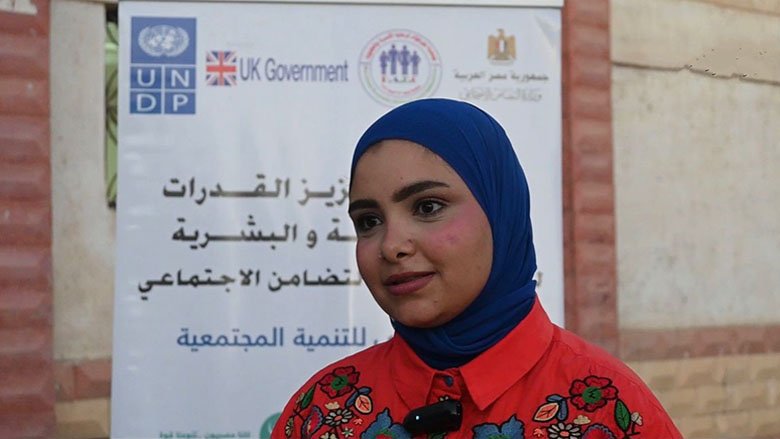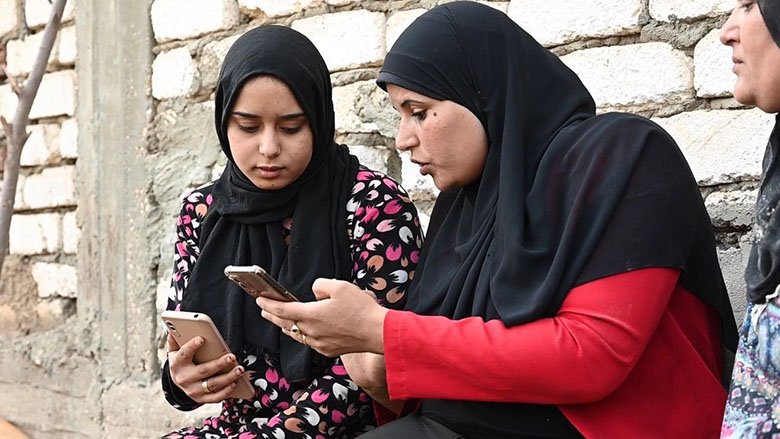“Early marriage is harmful to the education, health, and wellbeing of girls. I know that because I experienced those drawbacks myself when I got married at 17 years old and this is why I am passionate about raising awareness on those harms,” said Ghada Ahmed, a resident of Egypt’s Port Said governorate and a social worker in the “Waai” advocacy and awareness raising campaign. “Girls must focus on their education then move on to get jobs. Having a job builds character.”
The Waai (meaning “awareness” in Arabic) Program is a behavioral awareness and change platform launched in 2020 and a key intervention of the Takaful and Karama Cash Transfer Program (TKP). It aims to reach Egypt’s vulnerable citizens on 12 interlinked social messages including: combatting child marriage, fostering economic empowerment, advocating citizenship, positive parenting, education, combatting female genital mutilation, promoting good hygiene practices, maternal and child health, family planning, illegal migration, as well as the rights of persons living with disabilities.
“We raise the awareness of women on how they can start their businesses and accordingly generate sustainable incomes and become financially independent,” said Shaimaa Mohamed, another Waai social worker in Beni Sueif, Upper Egypt.
When it came to Shaimaa’s attention that one woman named Marzooka wanted her young daughter, Nada, to get married before reaching the legal age, Shaimaa spoke openly with Marzooka about the negative consequences her daughter would face. Marzooka and her husband were convinced and did not go through with the marriage. In her conversations with Marzooka, Shaimaa also told her about Waai’s economic empowerment activities. Marzooka embraced the idea and started her own business producing and selling cheese and butter.
Shaimaa also taught Nada how to use her smart phone to promote her mother’s products online. And Shaimaa went even further by walking them through how to best package and market their products. “I did not know about digital marketing before I attended this training. We increased our income because of this project, and our work is growing,” Marzooka said.
The Waai campaign is currently targeting poor communities with special focus on beneficiaries of the Takaful and Karama Program, led by the Ministry of Social Solidarity (MOSS). The Takaful and Karama Cash Transfer Program, which means “Solidarity & Dignity” in Arabic, is Egypt’s national flagship social protection program, launched in 2015 with support from the World Bank. It was complemented in 2020 with the launch of the FORSA, or “Opportunity’’, program for economic inclusion.
The Takaful part of the program provides monthly conditional cash transfers to poor households with children under 18 years provided they comply with health and education conditionalities. The Karama part of the program provides unconditional cash transfers to the elderly poor, orphans, widows, and persons living with disabilities. As of December 2023, the program has reached 4.67 million households (around 17 million citizens) and 74% of card holders are women.
The social messages that Waai focuses on were selected based on community dialogue and several focus group discussions with Takaful and Karama beneficiaries who helped identify what issues and social norms impact their lives. The program is a collective partnership between the government, UNDP, as well as several donors including UK, EU, and GIZ (German International Development Agency), and it is closely interlinked with Takaful and Karama, FORSA and many of the cash-plus interventions supported by the World Bank.
MOSS adopted an integrated approach building on Takaful and Karama’s dynamic social registry to link beneficiaries to key existing social programs (universal health insurance; food subsidies, etc.…), as well as to design interventions which would improve various aspects of the citizen’s quality of lives through tools which complement the cash transfers.
TKP and Waai are intertwined. Takaful and Karama provides a platform through which Waai can effectively identify and approach beneficiaries. Waai’s awareness raising program also complements the acceleration of the health and education conditionalities of Takaful transfers through communication campaigns, such as the importance of ongoing health checks for mothers and children and the priceless value of children continuing their education.
A diverse communication and outreach plan is a core component of Waai and ensures that the awareness messages are effectively delivered. Each social message campaign has its own slogan that is phrased in a simple and catchy way. By using local dialects and idioms, the campaigns can help capture the attention of audiences and make it easy for them to digest the message.
Takaful and Karama’s 15,000 social and community workers act as agents of change and include both men and women. Volunteers from NGOs play a key role in Waai’s communications methods as they speak directly to beneficiaries through house visits and seminars. The program also relies on community and religious leaders, TV and radio advertisements, and social media content on the MOSS’s government channels. Clips from popular Egyptian movies, which tackle relevant issues, are also used as a way to reinforce the message and spur dialogue on social media.
Shaimaa and Ghada are just two of many shining examples of people on the ground making the most out of the TKP and FORSA programs for Egyptian women. Women’s empowerment is a core area of focus in the World Bank Group’s 2023- 2027 Egypt Country Partnership Framework (CPF).
The CPF’s second high-level objective is “enhanced human capital outcomes” and focuses on supporting the provision of inclusive, equitable, and better health and education services and social protection programs. This is done through programs like Takaful and Karama as well as through several analytical pieces such as the Public Expenditure Review for Human Development Sectors which looks at the efficiency and effectiveness of Human Development programs including social assistance and the study on Social Norms and Female Labor Force Participation in Egypt done in collaboration with the National Council for Women which looks at how social and gender norms play a critical role in determining whether a woman can work, what kind of work she can do, and what responsibilities she has aside from paid work.
The World Bank is committed to enhancing the prospects and well-being of Egyptian girls and women, who are an integral driver to social and economic development.


